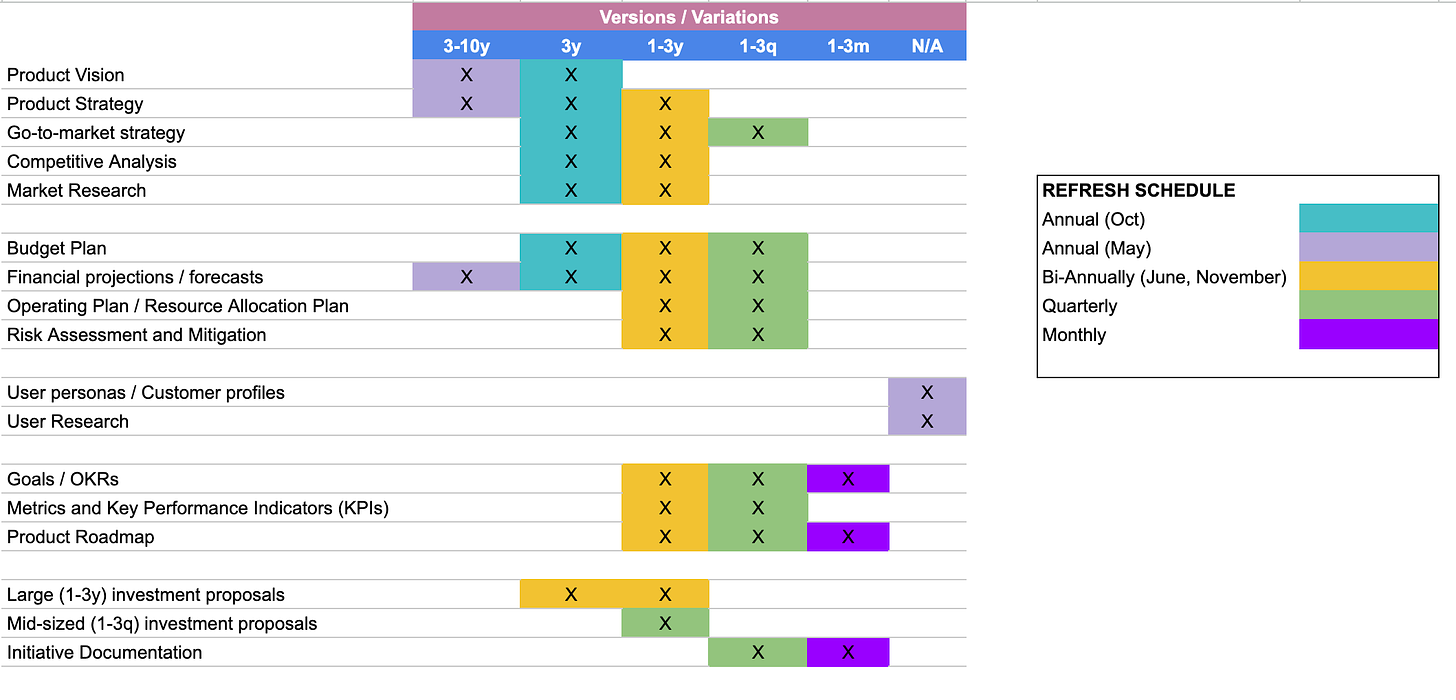🛠️ Product Strategy Stack vs. Decision Stack: What's the Difference (Part 1)
Product Strategy Stack
|
Dear Reader,
Everyone loves a Product Strategy framework.
But choosing between the Product Strategy Stack and Decision Stack isn't straightforward. Both put long-term artifacts like a Vision and Mission at the top and link their different elements. But knowing which works best for you requires decoding their layers.
Long-term Ambitions
Both stacks agree: you need an inspiring "roof" that transcends mere business goals. Mission, Strategy, and Goals fulfill different human needs. Mission is emotional, Strategy is logical, and Goals are measurable. Whether you call it Vision (Decision Stack) or Mission (Strategy Stack) matters less than using what resonates in your company.
You're looking for elements that create inspiration and motivation and describe the change you want to bring to your customers. "Be the change" is generic BS and neither a good Vision nor a Mission. Martin Eriksson's Mind the Product example "To make product people more successful by coming together to further our craft." is a great example.
The wording of your Mission or Vision doesn’t have to be unique - but its motivational force on team members should be.
Strategic Choices
Let's be clear: Strategy is about making (and communicating) choices that move you from status quo to vision within your market context. Importantly, neither stack prescribes how to do Strategy - they first and foremost focus on the value Strategy needs to create for you. Martin's curated Strategy toolkit shows how the actual strategic work happens outside the stack, with the stack capturing only the essence of choices made.
Where the stacks differ most is in their scope: The Decision Stack uses broader language applicable across any domain to make it applicable at a company/organization level, while the Product Strategy Stack explicitly focuses how product strategy nests within company strategy.
Here's where it gets practical: this scope difference shapes how you'll use each stack for strategy choices. While the Decision Stack keeps options open for any strategic decision, Ravi's Product Strategy Stack drives towards specific product choices - like how Slack and Discord make different strategic choices about third-party integrations to serve their respective markets.
Next week, I will work through both stacks' measurement and action layers and their real-life usage.
If you have ever benefited from my content, I'd appreciate it if you would share this newsletter on LinkedIn. It truly helps.
Thank you for Practicing Product,
Tim
Join my In-Person Workshops in Berlin
I'm excited to bring my beloved in-person workshops back to Berlin in January 2025. You can choose between 1-day workshops on Product Strategy, Product OKRs, or Product Discovery OR get the full 3-day experience for you or your team.
| LEARN MORE |
(reach out for custom team quotes)
As a Product Management Coach, I guide Product Teams to measure the real progress of their evidence-informed decisions.
I focus on better practices to connect the dots of Product Strategy, Product OKRs, and Product Discovery.
Product Practice Newsletter
1 tip & 3 resources per week to improve your Strategy, OKRs, and Discovery practices in less than 5 minutes. Explore my new book on realprogressbook.com
Product Practice #392 From Product Jargonto Plain English READ ON HERBIG.CO PUBLISHED Jan 23, 2026 READING TIME 3 min & 29 sec Dear Reader,I often feel that, somewhere along the way, we, as an industry, started optimizing for sounding like product people instead of speaking like humans in plain English (or any other language). What would happen if we dropped the product lingo and used plain English to describe what's needed? I find it increasingly liberating for product teams to describe...
Product Practice #391 Four Pragmatic Ways to Improve Opportunity Solution Trees in Practice READ ON HERBIG.CO PUBLISHED Jan 16, 2025 READING TIME 3 min & 56 sec Dear Reader, Opportunity Solution Trees (OSTs) are a widely popular visual aid for connecting solution space work to business goals through problem space elements (similar to Impact Mapping). From seeing the way product teams adopt them in practice, here are four ways I've seen improve their impact for your work: Remember that OSTs...
Product Practice #390 What's your Company'sAppetite for Risk? READ ON HERBIG.CO PUBLISHED Jan 9, 2026 READING TIME 5 min & 4 sec Dear Reader, Happy New Year! I hope you had a good time off during the holidays with a chance to reflect and recharge. I'm still recovering from over-caffeinization through The Barn's Christmas Coffee Selection and am so happy to be back to writing this newsletter. Onto this week's essay. The reason the adoption of new product operating models moves slowly in your...

